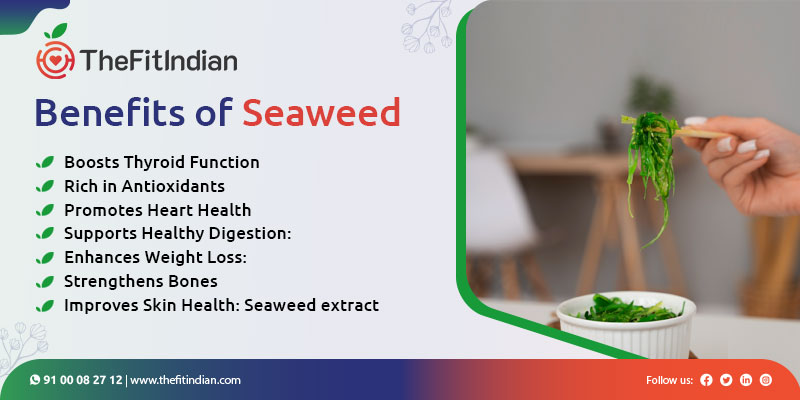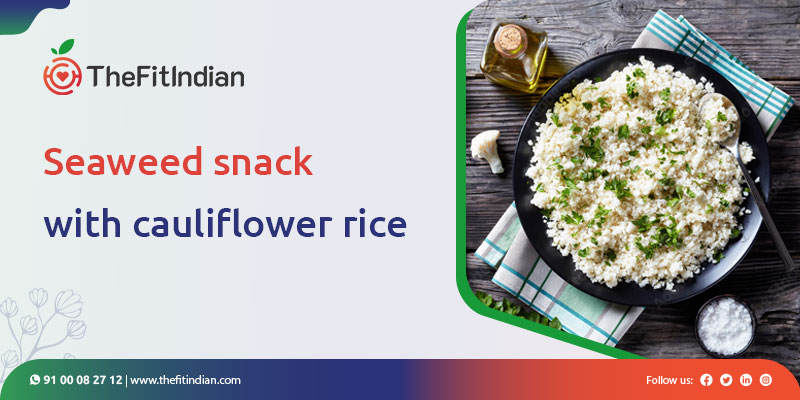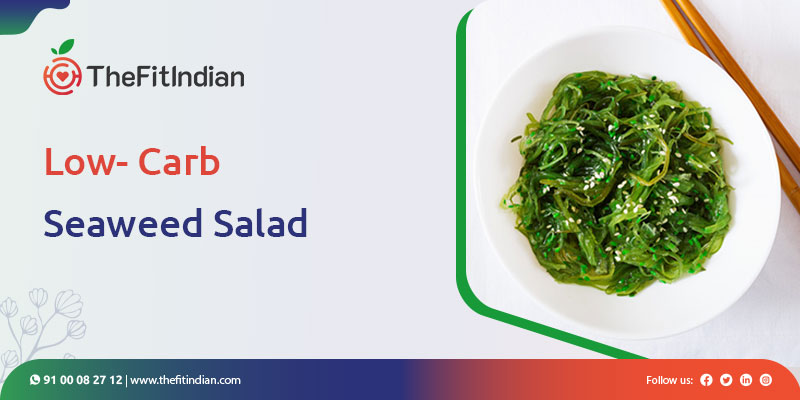Why is Seaweed a Superfood – How to Add it to Your Diet as Recipes
Reviewed by: Dr. T S Deepthi Sarojini | Author: Manoja Kalakanti

Are you exploring a new way to boost your nutrition and add some excitement to your diet? Look no further than Seaweed – the ocean’s gift to foodies and health enthusiasts alike. With its vibrant colors, bold flavors, and incredible health benefits, seaweed is quickly becoming the darling of the culinary world.
Whether you are a seafood lover or a landlubber, there is a seaweed recipe out there for you. But do not just take our word for it – this oceanic superfood has a long and fascinating history that spans cultures and centuries. From the ancient traditions of Asia to the cutting-edge kitchens of Europe and America, seaweed has made its mark as a versatile and nutritious ingredient. So, snap your chopsticks and get ready to dive into the world of seaweed as we explore its many benefits and share some of our favorite seaweed recipes for incorporating it into your diet.
What is seaweed, and Why is it a Superfood?
Seaweed is a marine plant that thrives in oceans and other saltwater bodies. It is a nutrient-dense food that boasts an impressive range of vitamins, minerals, and antioxidants. Seaweed is an excellent source of magnesium, iodine, calcium, iron, and vitamins A, C, E, and K. Moreover, it is low in calories, high in fiber, and contains minimal fat.
Seaweed can grow in various bodies of water, such as seas, lakes, and rivers. While algae from the sea are typically edible, freshwater varieties can be toxic. Edible seaweed is classified by color, with the most commonly consumed types being red, green, blue-green, and brown. In addition, seaweed can vary dramatically in size, ranging from microscopic phytoplankton to towering kelp rooted in the ocean floor. Now let us learn why seaweed is a superfood by understanding the seaweed benefits.
Benefits of seaweed
Seaweed has gained popularity recently for its potential health benefits and natural healing properties. Not only are seaweed remedies a rich source of vitamins and minerals, but they also contain unique compounds like fucoidan that have been shown to possess anti-inflammatory, anti-cancer, and immune-boosting properties, making them a promising addition to modern medicine. A few of the seaweed benefits are as follows:

1. Boosts Thyroid Function:
Iodine is essential for the proper functioning of the thyroid gland, and seaweed is a great natural source of this nutrient. Consuming seaweed regularly can help regulate thyroid function and maintain a healthy metabolism. This, in turn, can promote weight management and overall well-being.
2. Rich in Antioxidants:
Antioxidants protect the body from oxidative stress and damage triggered by free radicals. Seaweed contains many antioxidants, including carotenoids, flavonoids, and phycocyanins. These potent compounds help to reduce inflammation, promote healthy aging, and prevent chronic diseases.
3. Promotes Heart Health:
Seaweed is an excellent source of fiber, which is beneficial for maintaining a healthy heart. The fiber in seaweed helps lower cholesterol levels, which reduces the risk of heart disease. Additionally, the omega-3 fatty acids in some seaweed types can help lower blood pressure, improve blood flow, and reduce inflammation. Seaweed nutrition facts indicate that it is an excellent source of nutrients that promote heart health.
4. Supports Healthy Digestion:
Seaweed is a prebiotic food that helps the growth of beneficial gut bacteria. This improves digestive health and boosts the immune system. Seaweed’s fiber also helps regulate bowel movements, prevent constipation, and maintain a healthy gut.
5. Enhances Weight Loss:
Seaweed is low in calories and fiber, making it an ideal addition to a weight-loss diet. The fiber in seaweed helps keep you full for longer, reducing cravings and preventing overeating. The compounds alginate and fucoxanthin found in seaweed also help to reduce fat absorption and promote fat burning.
6. Strengthens Bones:
Seaweed is a rich source of calcium and magnesium, two essential minerals for strong bones. As a result, regular consumption of seaweed can help to retain bone density and reduce the risk of osteoporosis. Seaweed also contains vitamin D, which is crucial in calcium absorption and bone health. Seaweed’s medicinal facts indicate that it is a natural source of nutrients that support bone health.
7. Improves Skin Health:
Seaweed extract is a natural source of vitamins and minerals essential for healthy skin. The high levels of antioxidants in seaweed protect the skin from damage triggered by UV radiation and other environmental factors. Additionally, the vitamins C and E in seaweed help to promote collagen production and improve skin elasticity, lowering the appearance of fine lines and wrinkles.
Types of Seaweed and Their Unique Characteristics
Seaweed is a diverse group of marine plants and algae that grow in oceans, rivers, and lakes worldwide. There are thousands of species of seaweed, each with unique characteristics and uses.
A few types of seaweed that are found in India are as follows:
Nori: A popular sushi wrap, nori is red algae rich in protein, vitamin C, and antioxidants. It has a sweet and slightly salty taste.
Kombu: A brown algae commonly used in Japanese cuisine, kombu is high in iodine and minerals and is often used as a natural flavor enhancer in soups and broths.
Wakame: A green algae often used in miso soup and salads, wakame is rich in vitamins and minerals such as calcium and iron and has a slightly sweet taste.
Agar: A gel-like substance derived from red algae, agar is a vegetarian alternative to gelatin and a common ingredient in desserts and jellies. It has no taste or odor but provides a texture similar to gelatin.
The seaweeds that are found outside India are as follows:
Dulse: A red algae with a soft texture, dulse is commonly used in soups, salads, and snacks. It is high in protein and minerals like iron and potassium and tastes salty.
Irish Moss: A red algae with a gelatinous texture, Irish moss is often used as a thickening agent in desserts and soups. It is rich in minerals like iodine, iron, and calcium.
Sea Lettuce: A green algae with a delicate texture, sea lettuce is high in protein, fiber, and vitamins like vitamins A and C. It has a mild, slightly sweet taste.
Hijiki: A brown algae with a robust and earthy flavor, hijiki is rich in fiber and minerals like calcium and iron and is often used in Japanese cuisine.
Now let us look into the seaweed recipes and how to integrate them into your diet.
Seaweed Recipes to Include in Your Diet
The seaweed recipes that can change your diet into a nutritious and tasty one are as follows:
1. Seaweed snack with cauliflower rice

Packed with vitamins, this underwater veggie splashes in any dish.
Ingredients:
- Vegan mayonnaise-¼ Cup
- Toasted sesame oil-1Teaspoon
- Cauliflower rice-1 Bowl
- Ground flaxseeds- 1 Tablespoon
- Rice vinegar- 1 Tsp
- Tasting salt- According to taste
- Safflower oil- 2 Tsp
- Trumpet mushrooms – 4 Pieces
- Toasted seaweed and sliced cucumber for serving
Preparation: 10 Minutes. Cooking time: 30 Minutes
Directions:
- In a small bowl, whisk soy sauce and 1 Tbsp water until it becomes smooth. In another small bowl, whisk mayonnaise and sesame oil until it is mixed properly. Set both sauces aside.
- Heat a large nonstick skillet over medium-high. Add cauliflower rice, flaxseeds, and vinegar. Season it lightly with salt. Cook by stirring frequently and mash it with the back of a wooden spoon as cauliflower rice turns tender until it starts to hold together for about 5 minutes.
- Add safflower oil and mushrooms and cook, occasionally tossing, until it is tender and golden in spots.
- Pour both sauces into the cauliflower rice, and finally, add toasted seaweed and sliced cucumber.
- Serve hot and enjoy the healthy dish.
Nutritional Information:
- Calories: 190
- Carbohydrate: 15 g
- Protein: 18.5 g
- Fat:5.5 g
2. Low- Carb Seaweed Salad
The Low carb seaweed salad recipe can be a side dish accompanied by a low-carb, keto, and Atkins diet.

Ingredients:
- Dried and Toasted wakame seaweed- 1 Ounce
- Rice Vinegar- 2 Tbsp
- Soy Sauce -1Tsp
- Toasted Sesame Oil- 1Tbsp
- Ginger (finely grated)- 1 Tsp
- Garlic (minced)-½ Tsp
- Red pepper flakes-½ Tsp
- Carrot (shredded)- 1 Tbsp
- Sesame Seeds-½ Tbsp
Preparation: 10 Minutes. Cooking time: 15 Minutes
Directions:
- In a medium bowl, soak seaweed in warm water for 5 minutes till it softens. Drain the water, dry the seaweed for one day, and make it ready for the next procedure.
- In a dry bowl, add rice vinegar, soy sauce, ginger, red pepper flakes, sesame oil, and sesame seeds. Mix it thoroughly.
- Now add wakame seaweed and carrot, and mix it well.
- Enjoy the seaweed salad for your lunch.
Nutrition Information:
- Calories-74
- Carbohydrate- 5 g
- Protein- 4 g
- Fat-5 g
3. Seaweed Wrap
The seaweed is wrapped and folded with protein and natural herbs. It could be the best dinner.

- Ginger slices- ½ Tbsp
- Soy Sauce-½ Tsp
- Sesame Oil- 1Cup
- Carrot (shredded)- 1Cup
- Cabbage (shredded)-½ Cup
- Bell Pepper (diced)-1 Tbsp
- Onion (finely chopped)- 1 Whole
- Chicken fried (precooked with all ingredients)- 1 Cup
- Garlic Cloves (pushed through a garlic press)- 1 Tbsp
- Dried seaweed (Roasted)- 1 ounce (about 28.35 g)
Preparation: 10 Minutes. Cooking time: 25 Minutes
Directions:
- In a small bowl, mix soy sauce and sesame oil and put it aside.
- In a large bowl, mix carrot, cabbage, cooked chicken cooked, soya sauce, sesame oil, bell peppers, onion, and garlic cloves, and keep it aside for 10 minutes.
- Take a seaweed sheet, divide it into 4 parts, fill the mixture with seaweed, make a wrap, and fold it on two sides. Simultaneously repeat the same procedure for 3 seaweed sheets.
- In a hot pan, toast the seaweed wrap with sesame oil for 15 minutes.
Nutritional Information:
- Calories –117
- Carbohydrates-19 g
- Proteins- 9 g
- Fat-1.1 g
Summing Up
In conclusion, incorporating seaweed into your diet can provide many health benefits. From its impressive nutrient profile to its potential to support weight loss and improve gut health, seaweed is a superfood. Plus, with so many delicious ways to enjoy seaweed, from salads to soups to sushi, there is no reason not to try it.
So, the next time you want to switch up your diet or add a new flavor to your favorite dishes, consider reaching for some seaweed. You will do your body a favor and might discover a new culinary obsession. Who knows, you might even start feeling like a mermaid or merman with all that oceanic goodness flowing through your veins! So go ahead, dive in, and explore the incredible world of seaweed.
FAQs
Seaweed is a type of marine plant that grows in oceans and other bodies of saltwater.
Seaweed is added to biryani for its umami flavor and nutritional benefits. It also helps soften the rice and enhance the dish’s texture.
There are thousands of diverse types of seaweed, varying in color, size, and shape. In India, there are around 800 species of seaweed that have been identified. Some commonly found types of seaweed in India include Gracilaria, Sargassum, and Ulva.
Seaweed is important for its various health benefits, such as
Supporting heart health
Aiding digestion
Boosting the immune system
Seaweed is often referred to as a superfood due to its high nutrient density and health benefits. It is rich in minerals such as iodine, calcium, and iron and contains vitamins, antioxidants, and anti-inflammatory compounds.
Seaweed has numerous health benefits, including.
Supports immune system
Heart health
Aids in digestion
Promotes healthy skin and hair
Thyroid health
Apart from its nutritional benefits, seaweed has several advantages for daily life. It can be used as a natural fertilizer for plants and soil due to its rich mineral content. Seaweed extracts are also used in cosmetics and personal care products due to their hydrating, anti-inflammatory, and anti-aging properties. Additionally, seaweed can be used as a natural thickener in food products such as ice cream and salad dressings.
Seaweed is important for gut health because it is high in fiber, which helps to promote healthy digestion and prevent constipation. It also contains prebiotics, which support the growth of beneficial gut bacteria.
Yes, seaweed is rich in antioxidants, such as flavonoids and carotenoids, which help to protect the body from free radicals and oxidative stress. This can help lower the risk of chronic diseases like cancer.
Yes, seaweed can help with weight management because it is low in calories, fat, and fiber. It can also help to promote feelings of fullness and reduce the risk of overeating.




Manoja Kalakanti